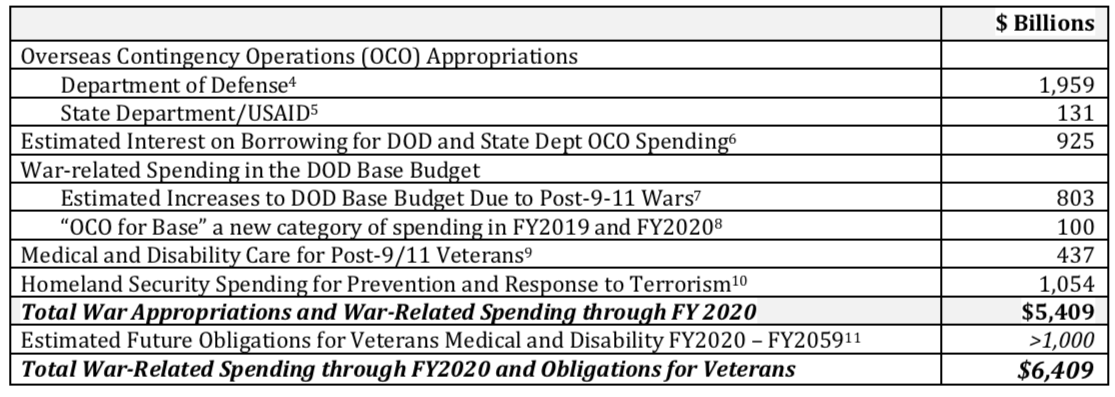The Costs of Post 9/11 Wars: $6.4 Trillion
US Budgetary Costs and Obligations of Post-9/11 Wars Through FY2020: $6.4 Trillion

Since late 2001, the United States has appropriated and is obligated to spend an estimated $6.4 Trillion through Fiscal Year 2020 in budgetary costs related to and caused by the post-9/11 wars—an estimated $5.4 Trillion in appropriations in current dollars and an additional minimum of $1 Trillion for US obligations to care for the veterans of these wars through the next several decades.[2]
The mission of the post-9/11 wars, as originally defined, was to defend the United States against future terrorist threats from al Qaeda and affiliated organizations. Since 2001, the wars have expanded from the fighting in Afghanistan, to wars and smaller operations elsewhere, in more than 80 countries — becoming a truly “global war on terror.” Further, the Department of Homeland Security was created in part to coordinate the defense of the homeland against terrorist attacks.
These wars, and the domestic counterterror mobilization, have entailed significant expenses, paid for by deficit spending. Thus, even if the United States withdraws completely from the major war zones by the end of FY2020 and halts its other Global War on Terror operations, in the Philippines and Africa for example, the total budgetary burden of the post- 9/11 wars will continue to rise as the US pays the on -going costs of veterans’ care and for interest on borrowing to pay for the wars. Moreover, the increases in the Pentagon base budget associated with the wars are likely to remain, inflating the military budget over the long run.
Overview
One of the major purposes of the Costs of War Project has been to clarify the types of budgetary costs of the US post -9/11 wars, how that spending is funded, and the long-term implications of past and current spending. This estimate of the US budgetary costs of the post-9/11 wars is a comprehensive accounting intended to provide a sense of the consequences of the wars for the federal budget. Since the 9/11 attacks, the Department of Defense appropriations related to the Global War on Terror have been treated as emergency appropriations, now called Overseas Contingency Operations (OCO).[3] When accounting for total war costs, the Department of Defense and other entities often present only Overseas Contingency Operation appropriations.
The Costs of War Project takes a broader view of war expenses because budgetary costs of the post -9/11 wars are not confined to military spending. Table 1 summarizes post-9/11 war-related costs and the categories of spending. Numbers and occasionally categories are revised in the Costs of War estimates when better information becomes available. For example, this year’s report uses newer interest rate data in calculating the estimated interest on borrowing for OCO spending. Additionally, this report revises the estimate of increases to the Pentagon base budget given new information, described below, on patterns of military spending and the relations between the OCO budget and base military spending. Further, the Department of Defense budget for FY2020 included new categories, denoting OCO spending intended for the base military budget, reflected in a separate line in Table 1.
Table 1. Summary of War Related Spending, in Billions of Current Dollars, FY2001–FY2020 Rounded to the nearest $billion.
Full Report: Click here to read the carefully documented report by Professor Neta C. Crawford of Boston University.
*
Note to readers: please click the share buttons above or below. Forward this article to your email lists. Crosspost on your blog site, internet forums. etc.
Neta C. Crawford is a Professor and Chair of the Department of Political Science at Boston University and a co-director of the Costs of War Project at Brown University’s Watson Institute and Boston University’s Pardee Center.
Featured image is from Jared Rodriguez / Truthout


